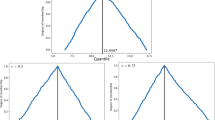Abstract
Classical tests for the equality of distributions of real-valued random variables are widely applied in Statistics. When the normality assumption for the variables fails, non-parametric techniques are to be considered; Mann-Whitney, Wilcoxon, Kruskal-Wallis, Friedman tests, among other alternatives. Fuzzy representations of real-valued random variables have been recently shown to describe in an effective way the statistical behaviour of the variables. Indeed, the expected value of certain fuzzy representations fully characterizes the distribution of the variable. The aim of this paper is to use this characterization to test the equality of distribution for two or more real-valued random variables, as an alternative to classical procedures. The inferential problem is solved through a parametric test for the equality of expectations of fuzzy-valued random variables. Theoretical results on inferences for fuzzy random variables support the validity of the test. Besides, simulation studies and practical applications show the empirical goodness of the method.
Access this chapter
Tax calculation will be finalised at checkout
Purchases are for personal use only
Similar content being viewed by others
References
Blanco-Fernández A, Ramos-Guajardo AB, Colubi A (2013) Fuzzy representations of real-valued random variables: applications to exploratory and inferential studies. Metron 71:245–259
Blanco-Fernández A, Casals RM, Colubi A, Corral N, García-Bárzana M, Gil MA, González-Rodríguez G, López MT, Lubiano MA, Montenegro M, Ramos-Guajardo AB, de la Rosa de Sáa S, Sinova B, (2014) A distance-based statistical analysis of fuzzy number-valued data. Int J Approx Reason 55:1487–1501
Colubi A (2009) Statistical inference about the means of fuzzy random variables: applications to the analysis of fuzzy- and real-valued data. Fuzzy Set Syst 160:344–356
Couso I, Dubois D (2009) On the variability of the concept of variance for fuzzy random variables. IEEE Trans Fuzzy Sys 17(5):1070–1080
Couso I, Dubois D (2014) Statistical reasoning with set-valued information: ontic vs. epistemic views. Int J Approx Reason 55:1502–1518
Diamond P, Kloeden P (1994) Metric spaces of fuzzy sets. World Scientific, Singapore
Gil MA, López-Díaz M, Ralescu DA (2006) Overview on the development of fuzzy random variables. Fuzzy Set Syst 157(19):2546–2557
González-Rodríguez G, Colubi A, Gil MA (2006) A fuzzy representation of random variables: an operational tool in exploratory analysis and hypothesis testing. Comput Stat Data Anal 51:163–176
González-Rodríguez G, Colubi A, Gil MA, Lubiano MA (2012) A new way of quantifying the symmetry of a random variable: estimation and hypothesis testing. J Stat Plann Inf 142:3061–3072
Huellermeier E (2014) Learning from imprecise and fuzzy observations: data disambiguation through generalized loss minimization. Int J Approx Reason 55:1519–1534
Körner R, Nather W (2002) On the variance of random fuzzy variables. In: Bertoluzza C, Gil MA, Ralescu DA (eds) Analysis and management of fuzzy data. Physica-Verlag, Heidelberg, pp 22–39
Kwakernaak H (1978) Fuzzy random variables—I. Definitions and theorems. Inf Sci 15:1–29
Puri ML, Ralescu DA (1986) Fuzzy random variables. J Math Anal Appl 114:409–422
Trutschnig W, González-Rodríguez G, Colubi A, Gil MA (2009) A new family of metrics for compact, convex (fuzzy) sets based on a generalized concept of mid and spread. Inf Sci 179:3964–3972
Tsanas A, Xifara A (2012) Accurate quantitative estimation of energy performance of residential buildings using statistical machine learning tools. Energy Buildings 49:560–567
Zadeh LA (1975) The concept of a linguistic variable and its application to approximate reasoning. Inf Sci 8:199–249
Acknowledgments
The research in this paper is partially supported by the Spanish National Grant MTM2013-44212-P, and the Regional Grant FC-15-GRUPIN-14-005. Their financial support is gratefully acknowledged.
Author information
Authors and Affiliations
Corresponding author
Editor information
Editors and Affiliations
Rights and permissions
Copyright information
© 2017 Springer International Publishing Switzerland
About this paper
Cite this paper
Blanco-Fernández, A., Ramos-Guajardo, A.B. (2017). Independent k-Sample Equality Distribution Test Based on the Fuzzy Representation. In: Ferraro, M., et al. Soft Methods for Data Science. SMPS 2016. Advances in Intelligent Systems and Computing, vol 456. Springer, Cham. https://doi.org/10.1007/978-3-319-42972-4_8
Download citation
DOI: https://doi.org/10.1007/978-3-319-42972-4_8
Published:
Publisher Name: Springer, Cham
Print ISBN: 978-3-319-42971-7
Online ISBN: 978-3-319-42972-4
eBook Packages: EngineeringEngineering (R0)



